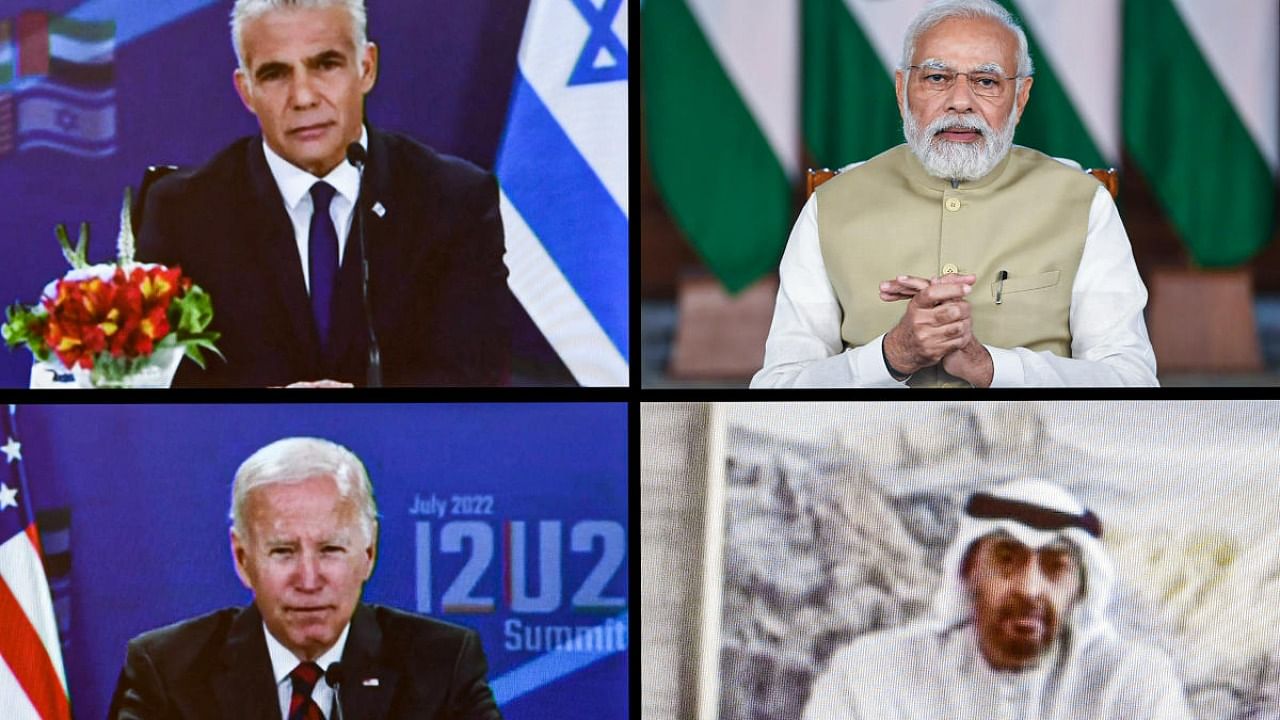
The United Arab Emirates will invest $2 billion in Madhya Pradesh, Gujarat and other states of India to develop a series of integrated food parks. This will be done with support from the private sectors of Israel and the United States, the newly launched ‘I2U2’ bloc decided in its first summit on Thursday.
The I2U2 also decided to mobilise support from companies based in Israel, the US and the UAE for a $330 million hybrid renewable energy project at Dwarka, Gujarat, to help India reach its goal of 500 gigawatt of power generation by 2030 without fossil fuels.
“The I2U2 has established a positive agenda from its very first summit today. We have identified joint projects in several areas and have also made a roadmap to take them forward,” Prime Minister Narendra Modi said, as he and President of the UAE Sheikh Mohamed bin Zayed bin Sultan Al Nahyan, virtually joined United States President Joe Biden and Israeli Prime Minister Yair Lapid for the summit—which marked the formal launch of the new four-nation I2U2 bloc.
The new bloc decided to start its journey by extending support to two projects—both in India.
The UAE’s investment to develop integrated food parks across India will be used to incorporate state-of-the-art climate-smart technologies to reduce food waste and spoilage, conserve fresh water, and employ renewable energy sources.
India will provide appropriate land for the project and will facilitate integration of farmers into the food parks. Israeli and American private sectors will be invited to lend expertise and offer innovative solutions that contribute to the overall sustainability of the project and help maximize crop yields. This will, in turn, help tackle food insecurity in South Asia and the Middle East, according to a joint statement released after the I2U2 summit.
The hybrid renewable energy project in Gujarat’s Dwarka, consisting of 300 megawatts of wind and solar power generating capacity complemented by a battery energy storage system, will also see UAE-based companies exploring opportunities to serve as critical knowledge and investment partners. The US Trade and Development Agency funded a feasibility study for the $330 million project. Israel and the US intend to work with the UAE and India to highlight private sector opportunities. Indian companies are keen to participate in this project and contribute to India’s goal of achieving 500 GW of non-fossil fuel capacity by 2030.
“Such projects have the potential to make India a global hub for alternate supply chains in the renewable energy sector,” the leaders of the four nations stated after the summit.
Biden said that the food parks to be set up with investment from the UAE with the support of the American and Israeli private sector experts had the potential to sustainably increase India’s food yields threefold in just five years.
“India is a major, major food producer in the world. Think of the beneficial impacts this will have on India’s farmers and the people suffering from hunger and malnutrition in the region,” said the US president. Lapid said that the food corridor between India and the UAE was a clear example of a creative solution to the problem of supply chain disruptions all the four nations were experiencing.
The food prices around the world skyrocketed over the past few months as Russia deployed warships to block grain exports from Ukraine’s port on the Sea of Azov and the Black Sea. Istanbul, however, on Wednesday hosted talks among representatives of Russia, Ukraine and the United Nations. The Turkish government later claimed to have made some progress towards resuming supply of grains from the ports of Ukraine.
Biden is on his maiden tour to Israel after taking over as the US president in January 2021. He and his host Lapid virtually joined Modi and Mohamed bin Zayed for the first I2U2 (Israel, India, US, UAE) summit.
The I2U2 was conceived when external affairs minister S Jaishankar visited Tel Aviv and Jerusalem in October 2021, and joined Lapid, his then counterpart in the Government of Israel, to hold a virtual meeting with Anthony Blinken, the US Secretary of State, and Sheikh Abdullah bin Zayed Al Nahyan, the foreign minister of the UAE.
Lapid later took over as the Prime Minister on July 1 last, succeeding Naftali Bennett.
The I2U2 is aimed to encourage joint investments in six mutually identified areas such as water, energy, transportation, space, health, and food security.
India's move to join the US, the UAE and Israel in the new bloc reflected its keenness to take advantage of the Abraham Accords to deepen engagement with Israel without risking its relations with the Arab nations of the Persian Gulf.
